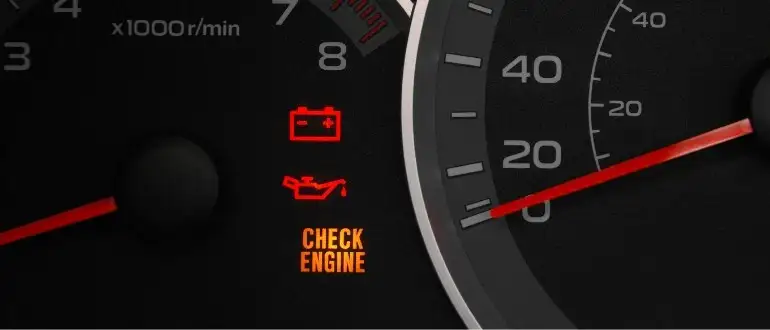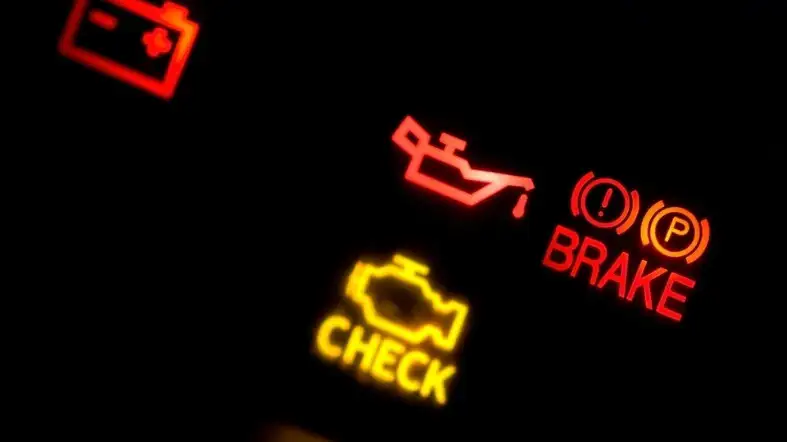The check engine light seen on the automobile dashboard is an indicator. The purpose of this is when the computer detects a problem with the vehicle’s transmission or exhaust system.
However, there are a few exceptions. In this article, we will briefly discuss can a check engine light turn off by itself?
Can a Check Engine Light Turn Off by Itself?
Yes, the check engine light can turn off by itself. This usually happens when the problem that caused the check engine light to turn on in the first place is fixed. Then it becomes enlightened and warns you, no matter how small or serious the error.

It can also happen if the car’s computer “forgets” the code that was causing the check engine light to come on.
This can happen if the battery is disconnected for a while, or if the car is driven for a long time without the check engine light coming on.
If the check engine light comes on and then goes off by itself, it is probably nothing to worry about.
However, if the light comes on and stays on, it is important to have the car checked by a mechanic to find out what is causing the problem.
Many different things can cause the check engine light to come on, and some of them are serious. If the light is on, it is important to have the car checked as soon as possible to make sure there is not a serious problem.
Some of the things that can cause the check engine light to come on include:
- A loose or missing gas cap
- the oxygen sensor problem
- catalytic converter problem
- A misfire in the engine
- Fuel system problem
- ignition system problem
- Also, a problem in the emissions control system
Is It Safe to Drive with Check Engine Light On?
It is not safe to drive with the check engine light on. The light indicates that there is a problem with the vehicle’s emissions system, and driving with the light on can cause further damage to the system.
If the check engine light is ON, it is important to have the vehicle checked by a mechanic as soon as possible to diagnose and repair the problem.
In some cases, the check engine light may come on due to a loose gas cap. In this case, simply tightening the gas cap may solve the problem.
However, it is always best to have the vehicle checked by a mechanic to be sure. Driving with the check engine light on is not advisable and can lead to further damage to the vehicle.
It is best to have the vehicle checked by a mechanic as soon as possible to diagnose and repair the problem.
Most Common Codes to Check Engine Light

Many technicians are also unable to determine the nature of the problems. Through which, the check engine light can be reset.
Then you will only need an OBD scanner to diagnose the problem in your car. To use this scanner, you must first link it to the car’s main computer.
Which is a very simple process. Besides, with this type of scanner, you can also link your cell phone. Then you will get problem codes on your phone. Now Let’s find out about some of the code that makes Check Engine Light.
Oxygen sensor code (P0171-P0175)
This code indicates that your system is very rich, the engine has too much fuel and too little oxygen. then this code can be seen and you need to fix the problem very quickly.
Engine misfire code (P0300-P0305)
Usually, your car has more than one cylinder. This code will be activated if any engine fires incorrectly. Then this code will show you.
Evaporative System Code (P0411, P0440, P0442, P0446, P0455)
A leak in the steam system of your car’s fuel tank will then show him this code. And as well as an error in the vapor pressure sensor this code can be seen.
Exhaust gas recirculation code (P0401)
This code indicates if the flow rate of any exhaust gas recirculation system in your car is insufficient.
Catalytic converter code (P0420, P0430)
This indicates that your catalyst converter is not working at maximum efficiency. Usually, it needs to be replaced or the oxygen (O2) sensors are not working properly. This code will be displayed when this problem occurs.
FAQs
When Your Check Engine Light Comes On And Then It Goes Off By Itself What Does It Mean?
There could be several reasons why the check engine light would come on and then go off by itself.
It could be a loose gas cap, a faulty sensor, or a problem with the emissions system.
If the light comes on again, it would be best to take the car to a mechanic to have it checked out.
A check engine light coming on and then going off by itself could indicate a loose gas cap, a faulty sensor, or a problem with the emissions system.
Does The Check Engine Light Go Off By Itself?
There is no definitive answer to this question. In some cases, the check engine light will go off by itself after the problem that caused it is resolved.
However, in other cases, the check engine light will remain on even after the problem is fixed.
If the check engine light is on and you are experiencing car problems, the best course of action is to take the car to a mechanic and have it checked out.
Final Thoughts
You should always keep in mind that in addition to the check engine lights, other indicators on the instrument panel will be illuminated for a short time when you start the car.
But they will shut themselves off after a while.
If the check engine icon is not illuminated after starting the vehicle, the warning may not work properly.
Which can cause a big problem. Then you must go to the mechanic immediately without delay.
